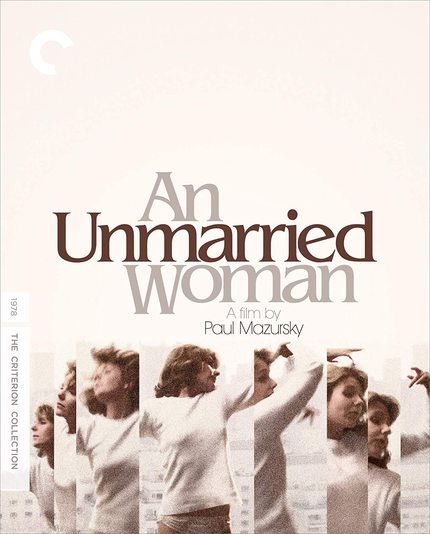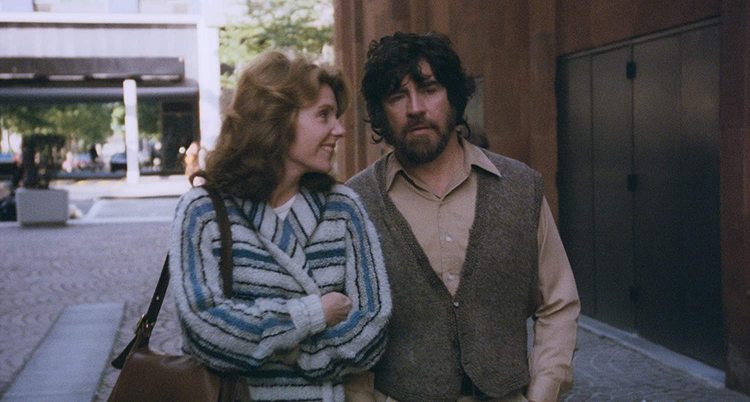Blu-ray Review: AN UNMARRIED WOMAN Hooks Up With Criterion
Writer/director Paul Mazursky guides Jill Clayburgh to an Oscar nomination in this bit of essential 1970s cinema.

Long considered by many to be the pinnacle decade in terms of filmmaking, 1970s cinema has had no shortage of veneration.
Yet, there was more to the decade than the go-to output of the Easy Riders, Raging Bulls/“Movie Brats” generation which included Friedkin, DePalma, Scorsese and Spielberg. There was also a less visible, if no less vital, tide of more sensitive auteur-driven filmmaking. Hal Ashby. John Cassavettes. Robert Altman. Paul Mazursky.
Of that latter grouping of generally more mature and grounded filmmakers, Mazursky earned the reputation of being most at home with stories about women. That earning landed firmly with 1978’s An Unmarried Woman. Something of a stand-alone revival of the classic Hollywood “women’s picture” genre model, the film tells the story of Erica Benton, a married woman cheated upon.
Jill Clayburgh scored an Oscar nomination for her resonant performance, carrying the movie all through the unswept streets New York City with an everywoman spunk and latent sexiness. Thankfully, she carries An Unmarried Woman with far more grace and panache than Erica Benton ends up having to carry an oversized painted canvas along the same said streets.
So, while Travis Bickle warped masculine notions of frontier justice in the same time and place, Mazursky taps wholly and completely into the complex inner life of an independent woman. As Erica seeks counseling amid her new lot in life as a divorcee, the film is unafraid to let her express contradictory thoughts, to let her take angry stands, and show her not at her best. (Such as when she completely freaks out upon discovery of her fifteen-year-old daughter [Lisa Lucas] making out with her boyfriend, abruptly hurling him out the door).
The movie talks about things rarely uttered in American film, like Erica’s recollection of her first period. It remains free of judgement even as she ventures back onto the dating scene and begins to freely scratch sexual itches. Along comes the charming Alan Bates, a successful artist who seems to be the right man for her at this time.
Thoroughly independent in its financing and creation, An Unmarried Woman nevertheless has a certain tactile urban scope that opens the movie beyond what could, in other hands, be a walled-in drama. Critically, it goes down more the way a comedy would; somehow light on its ballet feet and altogether digestible, but devoid of one-liners or gags.
This is Mazursky’s ingenious touch as writer/director. Paraphrasing author Sam Wasson in his new, brief video interview contained here as a bonus feature, Mazursky wasn’t the most cinematic of filmmakers, nor was he the funniest. But he understood human ticks and foibles in raw, real, and subtle ways, and knew how to put his actors at ease enough to deliver these key things through their performances. At the same time, it’s a tight film, devoid of that “improv-y” decompression that haunts the work of Judd Apatow and other later filmmakers who sometimes lean into his style.
From the upper-middle class fashions and furnishings to its casual dwelling in the NYC contemporary art scene to the film’s matter-of-fact disrobing, An Unmarried Woman is 1978 burnished to celluloid. Only at that moment in time could this film happen this way.
Composer Bill Conti’s original score, a fully orchestral undertaking that is no less in scope than his iconic Rocky score a few years earlier, is the kind of surprise that one would bet against working at all in this context, much less as perfectly as it somehow does. (Conti, a veteran of Mazursky films, clearly knew what he was doing). Erica’s bounce-back from her miserable, sniveling, self-victimizing husband (a perfectly spineless man-child portrayal by Michael Murphy) is, in its own way, every bit a zero-to-hero self-actualization ala Rocky Balboa, sans training montage and The Big Fight. Here, all the fights are small but stinging.
This is absolutely one of the great movies of the 1970s, one that any respectable consideration of that decade’s essential cinema cannot overlook. Known, even lauded, in its day but somewhat fallen by the wayside since (it didn’t help that Mazursky, Clayburgh, et al were unable to maintain this level of work) An Unmarried Woman might be considered something of a barometer for testing just how authentic one’s claimed devotion to the 1970s as Greatest Movie Decade truly is.
The 1970s decade is also known for its fragile, deteriorating film stocks and the difficulties in preserving or restoring the myriad of films that were shot utilizing said stocks. This coupled with the delicate trends in lighting and cinematography at the time have made for real challenges in maintaining 1970’s thoroughly analog cinema in the age of digital presentation.
With this new Criterion Blu-ray edition, however, An Unmarried Woman has perhaps never looked or sounded better, at least since it first opened theatrically. This movie-watching experience is a crackling and dynamic thing thanks to the no-doubt major efforts in bringing this new-feeling yet appropriately grained 4K restoration to film lovers.
Blu-ray special features:
• A 2005 audio commentary with director Paul Mazursky and actor Jill Clayburgh, each obviously recorded separately but edited together.
• New, brief video interviews with actors Michael Murphy and Lisa Lucas.
• New, brief video interview with author Sam Wasson.
• Audio recording of Mazursky at the American Film Institute in 1980, chock-full of information at one hour and forty-five minutes in length.
• The film’s trailer.
• PLUS: An essay by critic Angelica Jade Bastién.
An Unmarried Woman, clocking in just over two hours, never feels its length. It’s a beautifully extraordinary ordinary film by a male director who tries and manages to communicate a profoundly female experience. In a time when legitimate concerns about representation on and behind the camera dominate much of contemporary film conversations, Paul Mazursky’s An Unmarried Woman proves that transcending one’s own skin or gender in the name of empathy is possible. It may be rare in success or altruistic intention, but it is possible.
Criterion’s Blu-ray release of this pulsating and tender bit of film history makes it all the more immediate; something timeless even as it’s so very of its time.
An Unmarried Woman
Director(s)
- Paul Mazursky
Writer(s)
- Paul Mazursky
Cast
- Jill Clayburgh
- Alan Bates
- Michael Murphy
- Cliff Gorman








